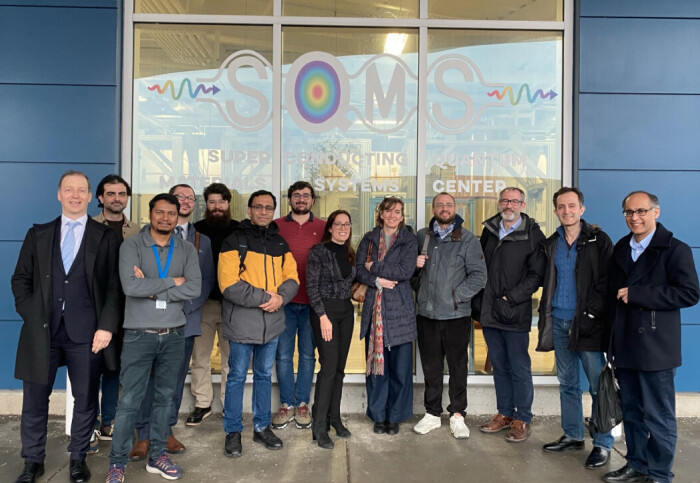Imperial strengthens international ties with new quantum project

Imperial has explored new quantum collaborations with the USA through a series of workshops and knowledge exchanges.
The Quantum ICoNYCh project brought together researchers from Imperial College London, New York, and Chicago, to strengthen quantum research collaborations between Imperial College London, the Chicago Quantum Exchange, and the emerging New York quantum ecosystem.
Fostering UK-USA Quantum Collaboration
 Funded by the UK Government’s Department for Science, Innovation and Technology (DSIT), the project kicked off with a virtual town hall meeting in November 2024, gathering members from all three locations.
Funded by the UK Government’s Department for Science, Innovation and Technology (DSIT), the project kicked off with a virtual town hall meeting in November 2024, gathering members from all three locations.
Members of Imperial’s Quantum Engineering Science and Technology Centre (QuEST) then participated in a series of knowledge exchanges, either visiting US hosts or hosting visits at Imperial, allowing researchers to explore shared research interests in 1-1 or small group discussions.
To expand collaboration, the project also organised two workshops. The first took place in early March 2025, where a delegation from Imperial’s QuEST Centre visited Chicago to explore collaborations with researchers at the Chicago Quantum Exchange. Later that month, QuEST hosted a two-day workshop at Imperial from 24 to 25 March, bringing together quantum researchers from London, New York, and Chicago.
Visit to Chicago
The visit included a workshop at the University of Chicago, where researchers from Imperial and the Chicago Quantum Exchange explored shared interests in quantum technologies. It provided a valuable opportunity to learn more about each institution’s research and identify areas for future collaboration.
Professor Peter Haynes, who leads the Centre for Quantum Engineering, Science, and Technology (QuEST) at Imperial, said:
 "This workshop was one of the most rewarding I have participated in, both because of the researchers' enthusiasm on both sides and the number of promising topics that emerged where international collaboration would add significant value."
"This workshop was one of the most rewarding I have participated in, both because of the researchers' enthusiasm on both sides and the number of promising topics that emerged where international collaboration would add significant value."
While in Chicago, the QuEST delegation also toured the Fermi National Laboratory, America’s particle physics and accelerator laboratory. Their visit to the Superconducting Quantum Materials and Systems (SQMS) Center sparked lively discussions on superconducting materials and their applications in quantum technologies.
The visit highlighted several areas where researchers share closely aligned interests, and both institutions are now developing opportunities for research collaborations.
Workshop in London
To conclude the Quantum ICoNYCh project, Imperial's QuEST Centre hosted a two-day hybrid workshop on Monday 24 and Tuesday 25 March 2025. The event brought together more researchers from Imperial, the Chicago Quantum Exchange, and the emerging New York quantum ecosystem.
The ICoNYCh project has exceeded expectations in terms of its productivity in seeding trans-Atlantic collaborations Professor Peter Haynes
The workshop featured a series of meetings, discussions, and collaborative sessions. Guests from the USA were welcomed, both in person and online, to celebrate the new connections and focus on future research collaborations and partnerships.
Researchers were able to share different areas where their research connected, such as optical quantum information processing for quantum computing, quantum machine learning, solid state qubits, and molecules that can be used in quantum science. Speakers also discussed the knowledge exchange that took place during the project.
Attendees visiting in person also toured labs at South Kensington campus, to learn more about Imperial’s cutting-edge quantum research and facilities.
Professor Peter Haynes said: "“The ICoNYCh project has exceeded expectations in terms of its productivity in seeding trans-Atlantic collaborations in promising areas of mutual interest that we are now actively pursuing.
QuEST thanks everyone involved in the project and we look forward to future collaborations on the exciting topics identified."
Article text (excluding photos or graphics) © Imperial College London.
Photos and graphics subject to third party copyright used with permission or © Imperial College London.
Reporter
Kayleigh Brewer
Department of Materials